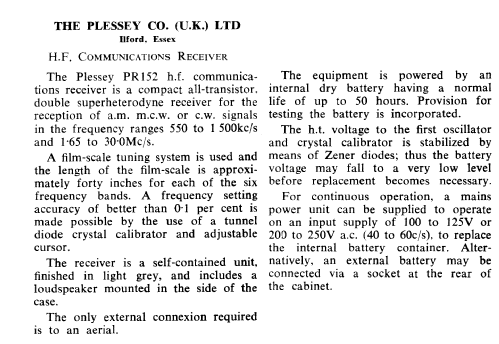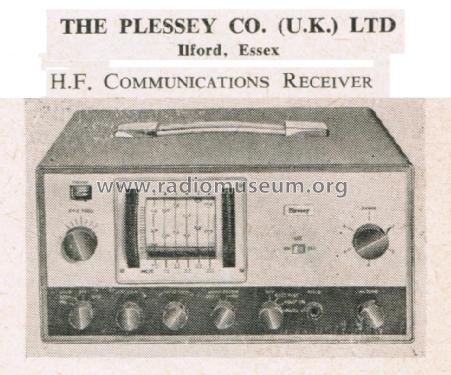HF Communications Receiver PR152
Plessey; Ilford
- País
- Gran Bretaña (GB)
- Fabricante / Marca
- Plessey; Ilford
- Año
- 1962 ?
- Categoría
- Receptor profesional (puede incluir bandas de aficionados)
- Radiomuseum.org ID
- 335859
Haga clic en la miniatura esquemática para solicitarlo como documento gratuito.
- Numero de transistores
- Hay semiconductores.
- Semiconductores
- Principio principal
- Superheterodino doble o triple conversión
- Gama de ondas
- Bandas de recepción puestas en notas.
- Tensión de funcionamiento
- Pilas + jack (etc.) para alimentación externa. / AC 40/60 Hz: 100-125; 200-250 / DC: 9 Volt
- Altavoz
- Altavoz dinámico (de imán permanente)
- Material
- Metálico
- de Radiomuseum.org
- Modelo: HF Communications Receiver PR152 - Plessey; Ilford
- Forma
- Sobremesa de cualquier forma, detalles no conocidos.
- Anotaciones
-
The Plessey PR152 HF communications receiver is a compact all-transistor double superheterodyne receiver for the reception of AM, MCW or CW signals in the frequency ranges 550 - 1,500Hz and 1.65 - 30.0MHz. With a six frequency band film-scale tuning system. A frequency setting accuracy of better than 0.1% is made possible by the use of a tunnel diode crystal calibrator and adjustable cursor. The receiver is a self-contained unit, finished in light grey, and includes a loudspeaker mounted in the side of the case. The only external connexion required is to an aerial.
The equipment is powered by an internal dry battery having a normal life of up to 50 hours. Provision for testing the battery is incorporated. For continuous operation, a mains power unit can be supplied to operate on an input supply of 100 to 125V or 200 to 250V AC (40 to 60Hz), to replace the internal battery container. Alternatively, an external battery may be connected via a socket at the rear of the cabinet.
- Mencionado en
- -- Original-techn. papers. (Electronic Engineering, volume 34, year 1962, October)
- Autor
- Modelo creado por Pier Antonio Aluffi. Ver en "Modificar Ficha" los participantes posteriores.
- Otros modelos
-
Donde encontrará 14 modelos, 11 con imágenes y 3 con esquemas.
Ir al listado general de Plessey; Ilford

